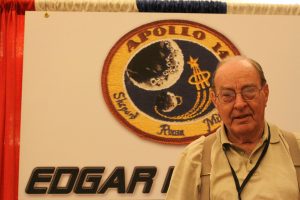Ed Mitchell: the most famous believer

Where tourism meets conspiracy
1 September, 2012How Asean become the world’s economic bright spot
1 September, 2012Discovery Channel Magazine, September 2012
Edgar Mitchell is one of only 12 men to have walked on the moon. As lunar module pilot on Apollo 14, alongside his commander, the legendary Alan Shepard, he was the sixth man to set foot on another world.
Mitchell was always an odd one out among the gung-ho astronaut corps, despite a classic Apollo background including test flight experience and a term flying in the Korean War. Secretly, he agreed with friends to hold an experiment in extra-sensory perception (ESP) on the way to and from the moon, to see if they could accurately interpret what he was thinking over such great distances; he would call the results “meaningful”.
Then, on the way back from the moon, came an experience that changed his life – which would put him on a path to the pursuit of consciousness, quantum physics, and the principle of sustainable “zero-point” energy as academic subjects for the rest of his life, picking up some unusual views on extraterrestrials along the way. And now, in a ballroom in Tucson, Arizona, Mitchell tells us about it.
Can you describe the moment of epiphany you felt on the way back from the moon on Apollo 14?
My tasks on the mission were roughly completed on the moon, so coming back home I could be a little bit more relaxed. Our orientation was perpendicular to the plane of the ecliptic, and rotating, which meant that every two minutes you had a picture of the earth, moon and sun coming through the porthole, and a 360 panorama of the heavens. And that’s pretty wild, especially since outside the atmosphere the stars are 10 times as bright and numerous as we can see on earth.
Add to that, through my studies at MIT and Harvard on astronomy, I knew that the star systems were what manufactured the molecules that make up our bodies. So all matter is made of star systems; we’re all stardust, and we’re all the same stuff. That was… that was a big wow.
After I got back, I realized that the story of ourselves as told by science was possibly flawed, because we didn’t have all the answers. And the story of ourselves as told by our religious cosmologies was archaic, and probably flawed. So now that we were having this whole new picture of the heavens, and the enormity of the universe of which we know so little – it was a wow, an a-ha, an epiphany, that we’re just starting to get acquainted with what we are all about. But I didn’t understand it immediately.
Many men came back from the moon different. Duke and Irwin found religion, Bean found art. Do you think you would feel this way without having gone to the moon?
I don’t know, but the fact is that all of us who went to the moon and looked back at the earth agreed that if we could get out political leaders to have summits in space, we would have different political systems. It is a life changer. We might not all have had exactly the same experience I had, or describe it in the same way, but it would amount to the same thing: the powerful experience of reshaping earth, and the way you look at our whole place in the cosmos.
To see the rest of this article, contact me or Discovery Channel Magazine.
See also: https://www.chriswrightmedia.com/the-truth-is-out-there/
And:https://www.chriswrightmedia.com/where-tourism-meets-conspiracy
